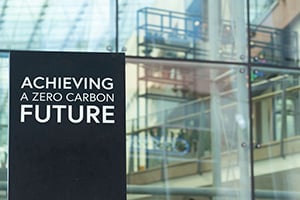By Calvin Furbee
Sustainability Analyst
Sustainable Investment Group (SIG)

As the economy becomes dominated by the younger generations, sustainability matters more than ever. Generation Z, which includes everyone born after 1996, will make up the largest portion of the U.S. population and economy in the coming years. Being exposed to the internet and modern technology since birth, along with experiencing the drastic social and societal changes of the 2010s has shaped a generation that is extremely passionate about a multitude of global issues. One of the top issues Gen Z cares most about is climate change and sustainability. This has already made a visible impact on the way Generation Z spends their money, where they choose to live, and who they choose as their employer. Being able to recognize the pending impact of Gen Z on the global economy and the importance of sustainability will dictate the success of future businesses.
 Generation Z is about to become the largest consumer base in the U.S. and global economy. With about 90.5 million members just within the U.S, The entrance of Gen Z into the economy creates a very large market with a substantial amount of purchasing power. The businesses that can best recognize the unique buying preferences and habits will be able to capitalize on this young market. The passion Gen Z has surrounding a multitude of social and environmental issues has carried over heavily to how they make purchasing decisions. Businesses that have had poor track records of environmental stewardship are starting to feel the pressures of Gen Z buying habits. This trend is abundantly clear in the retail sector, where many “fast fashion” brands that have prioritized cheap materials and mass production over sustainable sourcing have begun to falter. This is made clear by the bankruptcy of several big-name fast fashion brands such as Forever 21, Aeropostale, and J. Crew along with retailers like H&M and Zara that are nearing bankruptcy. Gen Z is not only turning away from unsustainable brands but is embracing and willing to pay more for sustainable products. Surveys of Gen Z members has shown that 73% of them are willing to pay more for sustainability, a majority of which were willing to pay up to a 10% premium. These buying preferences do not just impact retail, but all choices of Generation Z.
Generation Z is about to become the largest consumer base in the U.S. and global economy. With about 90.5 million members just within the U.S, The entrance of Gen Z into the economy creates a very large market with a substantial amount of purchasing power. The businesses that can best recognize the unique buying preferences and habits will be able to capitalize on this young market. The passion Gen Z has surrounding a multitude of social and environmental issues has carried over heavily to how they make purchasing decisions. Businesses that have had poor track records of environmental stewardship are starting to feel the pressures of Gen Z buying habits. This trend is abundantly clear in the retail sector, where many “fast fashion” brands that have prioritized cheap materials and mass production over sustainable sourcing have begun to falter. This is made clear by the bankruptcy of several big-name fast fashion brands such as Forever 21, Aeropostale, and J. Crew along with retailers like H&M and Zara that are nearing bankruptcy. Gen Z is not only turning away from unsustainable brands but is embracing and willing to pay more for sustainable products. Surveys of Gen Z members has shown that 73% of them are willing to pay more for sustainability, a majority of which were willing to pay up to a 10% premium. These buying preferences do not just impact retail, but all choices of Generation Z.
We also see these trends visible in how sustainability conscious companies are getting ahead in the real estate and employment markets. Many Gen Z members are currently in college and entering the job market, which means they are looking to live in off-campus housing and apartments. Gen Z renters play very close attention to the construction materials, sustainability goals, and employment practices of the properties from which they rent. Many investors and market analysts believe property managers need to embrace Environmental, Social, and Governance criteria if they want to attract younger renters. Devotion to environmental practices and transparency also spans to the workplace, where Gen Z has been making a noticeable impact on companies attempting to attract fresh talent. JLL reported that 70% of Millennials prefer to work for companies with strong sustainability agendas, which is a clear indication that the issue will be extremely important for Gen Z as well. The most effective strategies companies have employed to attract Gen Z involves making very visible changes to their operations regarding sustainability. A common strategy is employing Environmentally Sustainable Design (ESD) through retrofitting current buildings to rely more on renewable energy and to become more energy efficient. ESD also uses the natural environment to improve workplace quality, focusing on natural light and ventilation to maintain a healthy office environment. Companies can also analyze the amount of waste they create both up and down stream, looking for ways to divert garbage from landfills and to reduce single-use plastics.
It’s clear businesses are beginning to adopt sustainability not only to protect the environment, but to keep up with the market changes brought on by younger and more conscious generations. Sustainable Investment Group (SIG) can help businesses set and achieve their sustainability goals through a myriad of services. Whether a company wants to attract younger talent through improving the health and impact of their workplace or wants to save money by increasing energy efficiency and reducing water consumption, SIG along with its team of trained consultants and engineers can ensure businesses adapt and find success with the coming generations.
Related article:
© 2020 Sustainable Investment Group (SIG). All rights reserved.



